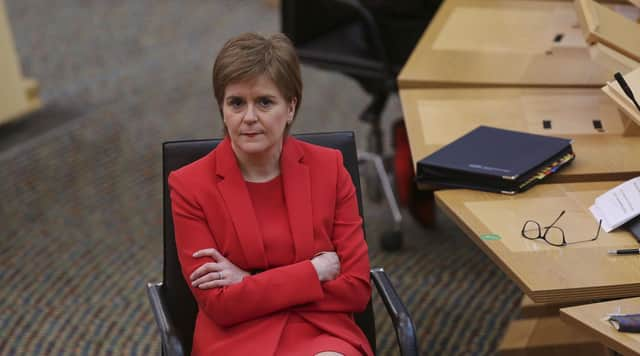Vaccine supply to drop by 500,000 doses next month amid calls for explanation of delay


Second doses will have to be prioritised at times in the coming weeks, the First Minister told MSPs on Thursday, but she insisted that the current vaccination targets will be met.
This includes a first dose for everyone in the top nine JCVI priority groups by mid April – those over 50, the under 50s with underlying health conditions and unpaid carers – and for all adults by the end of July.
Advertisement
Hide AdAdvertisement
Hide Ad"At present, we expect that, over the next month, we will have approximately 500,000 fewer doses than we had previously anticipated,” Ms Sturgeon said.
"For that reason, there may be periods in April when we need to prioritise second doses. I want to be clear, however, that as things stand, we still expect to offer a first dose of the vaccine to the remaining priority groups as set out by the Joint Committee on Vaccination and Immunisation by the middle of next month, as planned.”
It comes just days after Ms Sturgeon announced the most recent drop in supply was coming to an end and that the country could expect to see the highest ever weekly vaccination total this week, at 400,000 doses.
The Scottish Government initially intended to deliver 400,000 doses a week from the end of February, but this target was delayed after a drop in supply of Pfizer vaccine in late February, followed by a further supply dip announced at the beginning of March.
So far 2,023,002 Scots have received a first dose of vaccine, and 192,100 have been given a second.
Some 74 per cent of 60 to 64 year olds have now been given a first dose, along with 44 per cent of 55 to 59 year olds.
Labour leader Sir Keir Starmer called on the UK government to make clear what the supply problems with vaccines are after a visit to a vaccination centre in Edinburgh alongside Anas Sarwar.
"I am concerned about the delays, we need to get to the bottom of it and we need transparency from the government about what the problem is,” he said.
Advertisement
Hide AdAdvertisement
Hide AdUK Health Secretary Matt Hancock told MPs on Thursday that the supply reduction is partly due to needing to retest a batch of 1.7 million doses, as well as a delayed shipment of five million doses of AstraZeneca vaccine from Indian manufacturer the Serum Institute.
Downing Street did not deny suggestions from Adar Poonawalla, Chief Executive of the firm, that the Indian government was temporarily blocking the vaccine exports.
Mr Poonawalla told The Telegraph: “It is solely dependent on India and it has nothing to do with the SII (Serum Institute of India). It is to do with the Indian government allowing more doses to the UK.”
A spokesperson for Boris Johnson said: “I would point back to what the Serum institute have said and the fact that they are one of the manufacturers of the Oxford/AstraZeneca vaccine.
“We produce it here in the UK and it’s produced elsewhere as well so we will continue to work with the manufacturers of the vaccine.”
A message from the Editor:Thank you for reading this article. We're more reliant on your support than ever as the shift in consumer habits brought about by coronavirus impacts our advertisers.
If you haven't already, please consider supporting our trusted, fact-checked journalism by taking out a digital subscription.
Comments
Want to join the conversation? Please or to comment on this article.